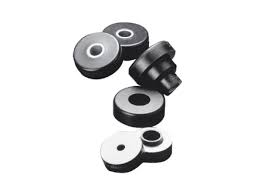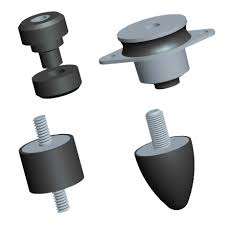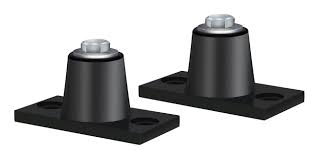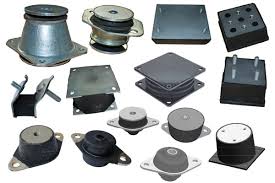Acoustic vibration isolators play a crucial role in enhancing the performance of equipment. By effectively isolating and dampening vibration...
Acoustic vibration isolators play a crucial role in enhancing the performance of equipment. By effectively isolating and dampening vibrations, these devices help minimize noise, improve stability, and extend the lifespan of various machinery and tools. The use of acoustic vibration isolators has become increasingly prevalent in industries where precision, accuracy, and smooth operation are essential. In this article, we will explore the benefits and applications of acoustic vibration isolators in enhancing equipment performance.
Acoustic vibration isolators are designed to minimize the transmission of vibration and noise between equipment and its surrounding environment. By using materials such as elastomers, springs, or air chambers, these isolators effectively reduce the impact of vibration on the performance and longevity of equipment. In industrial settings, they can be used to isolate machinery from structural vibrations, ensuring smooth operation and preventing damage to sensitive components. In addition to enhancing equipment performance, acoustic vibration isolators also contribute to a quieter and more comfortable work environment for personnel.
Acoustic vibration isolators are essential for enhancing equipment performance by minimizing the transmission of vibration and noise. These isolators utilize materials such as elastomers, springs, or air chambers to effectively reduce the impact of vibration on equipment. They are widely used in industrial settings to isolate machinery from structural vibrations, ensuring smooth operation and preventing damage to sensitive components. Apart from improving equipment performance, acoustic vibration isolators also contribute to a quieter and more comfortable work environment for personnel.
The Benefits of Using Acoustic Vibration Isolators in Industrial Settings

In various industries, the use of acoustic vibration isolators has become a key component in minimizing the effects of unwanted noise and vibration. These isolators help to dampen vibrations and absorb sound, resulting in improved productivity, comfort, and safety. Whether it's in industrial machinery, recording studios, or automotive applications, the right acoustic vibration isolators can make a significant difference in reducing noise pollution and ensuring a more pleasant environment for workers, users, and surrounding communities.
Acoustic vibration isolators offer several benefits in industrial settings, including reducing noise pollution, improving equipment performance, and increasing worker safety. These isolators can minimize the transmission of vibrations from heavy machinery and equipment to the surrounding environment, leading to a quieter and more comfortable workplace. Additionally, by absorbing and dampening vibrations, they can help prevent damage to sensitive equipment and machinery, ultimately extending their lifespan and reducing maintenance costs. Furthermore, acoustic vibration isolators can also help protect workers from the harmful effects of prolonged exposure to high levels of noise and vibrations, ultimately leading to a healthier and more productive work environment.
How Acoustic Vibration Isolators Can Improve Sound Quality in Recording Studios

Acoustic vibration isolators can improve sound quality in recording studios by reducing the transmission of unwanted vibrations from external sources such as foot traffic, HVAC systems, or nearby construction. This helps create a more consistent and controlled acoustic environment, allowing for better recording and playback of audio. Additionally, vibration isolators can help minimize resonances and standing waves within the studio space, leading to a more accurate monitoring of sound and improved overall sound quality in the recordings.
Maximizing Machine Efficiency with Acoustic Vibration Isolators
hvac vibration isolators residential

Maximizing machine efficiency with acoustic vibration isolators involves selecting the proper isolator design and material to minimize the transmission of vibrations. Isolators provide a barrier between the machine and its foundation, reducing the impact of vibrations on surrounding equipment and structures. This helps improve the overall performance and lifespan of industrial machinery. By minimizing vibrations, acoustic vibration isolators can also enhance worker safety and reduce the risk of equipment failure. Investing in high-quality isolators tailored to specific machine requirements is essential for achieving maximum efficiency and productivity.
The Role of Acoustic Vibration Isolators in Reducing Noise Pollution

Acoustic vibration isolators play a crucial role in reducing noise pollution by minimizing the transmission of vibration and noise from machinery and equipment to the surrounding environment. These isolators are designed to absorb and dampen the energy generated by vibrations, thus preventing them from being transmitted through the structure of a building or facility. By effectively isolating the source of the vibration, these devices help to reduce the overall noise levels, creating a more peaceful and comfortable environment for occupants. This is particularly important in industrial settings, where heavy machinery and equipment can generate high levels of noise that can disturb nearby communities. By incorporating acoustic vibration isolators into the design of industrial facilities, the impact of noise pollution can be significantly reduced, contributing to a healthier and more sustainable environment for all.
Choosing the Right Acoustic Vibration Isolators for Your Home Theater
Acoustic vibration isolators are an essential component of a home theater setup as they help to minimize the impact of external vibrations on the sound quality. When choosing the right acoustic vibration isolators for your home theater, there are a few key factors to consider. Firstly, it's important to assess the weight and size of your audio equipment in order to select isolators that can effectively support and isolate the specific components. Additionally, the type of flooring in your home theater space can also impact your choice of isolators, as different materials and construction can affect vibration transmission. Another important consideration is the level of isolation required for your system. For some users, basic isolation may be sufficient, while others may require more advanced solutions to achieve optimal sound quality. This could include features such as adjustable leveling or additional isolation pads. Additionally, the cost and budget for your isolators should be taken into account. There are various options available at different price points, so it's important to find a balance between performance and affordability. In conclusion, selecting the right acoustic vibration isolators for your home theater involves assessing the weight and size of your equipment, the type of flooring, the level of isolation required, and your budget. By carefully considering these factors, you can ensure that your home theater system achieves the best possible sound quality.
The Science Behind Acoustic Vibration Isolators and Their Effectiveness
Acoustic vibration isolators work by reducing the transmission of noise and vibration from one structure to another. They are commonly used in buildings to isolate mechanical equipment, such as HVAC systems and generators, from the surrounding structure to reduce the transfer of noise and vibration to occupied spaces. The effectiveness of acoustic vibration isolators is determined by their ability to absorb and dissipate vibrations, as well as their ability to provide a barrier to the transmission of sound waves. This is typically achieved through the use of materials that are designed to absorb and dampen vibrations, such as rubber or neoprene, and by incorporating multiple layers of material to provide a barrier to sound transmission. The science behind the effectiveness of acoustic vibration isolators lies in their ability to reduce the transmission of both airborne and structure-borne noise. By isolating mechanical equipment from the surrounding structure, they can significantly reduce the impact of noise and vibration on building occupants. Additionally, acoustic vibration isolators can also help to protect sensitive equipment from the damaging effects of vibration, leading to improved equipment performance and longevity. Overall, the science behind acoustic vibration isolators is based on their ability to absorb, dampen, and block the transmission of noise and vibration, ultimately leading to a quieter and more comfortable environment for building occupants.
Innovative Designs in Acoustic Vibration Isolators for Automotive Applications<
vibration isolation systems/h2>
Innovative designs in acoustic vibration isolators for automotive applications are focused on reducing the transmission of vibrations and noise from the vehicle's powertrain, engine, and road surfaces to the passenger compartment. These isolators typically use advanced materials and engineering techniques to effectively minimize the impact of vibrations on the vehicle occupants, resulting in a quieter and more comfortable driving experience. Some of the key factors considered in the design of these isolators include durability, weight, cost-effectiveness, and compatibility with various vehicle designs and configurations. Additionally, advancements in this field may also address environmental concerns by reducing the overall noise pollution generated by automotive vehicles.
Enhancing Comfort and Safety with Acoustic Vibration Isolators in Vehicles
Acoustic vibration isolators in vehicles are designed to reduce the transfer of vibration and noise from the vehicle's engine, suspension, and road surface into the passenger cabin. These isolators typically consist of special materials and designs that absorb and dissipate vibration and noise, thus enhancing comfort for passengers and reducing driver fatigue. In addition to improving comfort, acoustic vibration isolators also play a role in ensuring safety in vehicles. By reducing the transmission of vibration and noise, isolators help to minimize distractions for the driver, allowing for better focus and concentration on the road. This can ultimately contribute to safer driving conditions and a decreased risk of accidents. Overall, the implementation of acoustic vibration isolators in vehicles serves to create a more pleasant and secure driving experience for passengers and drivers alike.
In conclusion, acoustic vibration isolators are effective tools for enhancing equipment performance by minimizing the impact of external vibrations. By using these isolators, businesses can improve the reliability and accuracy of their equipment, ultimately leading to increased productivity and cost savings. Implementing acoustic vibration isolators is a practical and efficient way to mitigate the negative effects of vibrations on equipment, ensuring smooth and uninterrupted operation.
See also
https://www.techproducts.com/ https://www.avs.co.in/vibration-isolation.html
